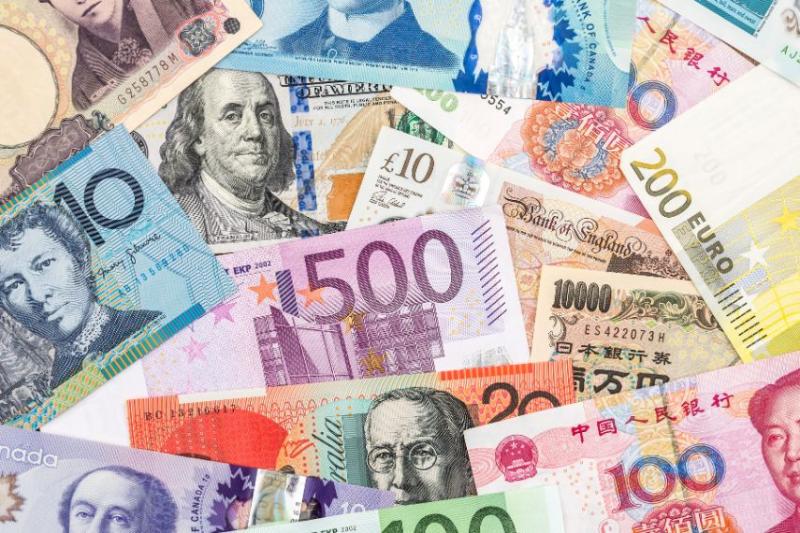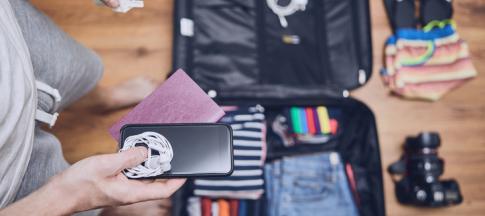
It’s important to be informed when it comes to getting the best exchange rates on your travel money.
We’ve broken down everything you need to know about exchange rates, spending your money abroad, and some common mistakes to avoid.
What is exchange rate, and how does it work?
Exchange rate is the rate at which you can exchange one currency for another. This means the value of one currency when converting it into another.
For example, if you’re travelling to a country whose currency is the Euro, on average in 2024, £1 was worth around €1.1811.
The rate constantly rises and falls, and it's different depending on which currency you need.
You want to exchange your cash when the exchange rate is the most favourable, meaning you’ll get more currency for your money.
The main options for spending money abroad
When travelling abroad there are a few ways you can choose to spend your money. Here are the advantages and disadvantages of them.
Cash
To get the best rates when switching your pounds for Euros, dollars or any other currency, you should compare rates offered by different companies.
Exchange rates fluctuate a lot, so it can be difficult for consumers to know the best time to exchange cash.
One way around this is to order your cash at the current rate and pick it up before leaving.
If the pound drops in value, you’ll have benefitted from ordering your cash when rates were better. If it increases in value, you can cancel your order and buy your currency at a better rate.
Some companies may charge a fee for cancelling your order, so look for a bureau de change that offers free cancellations.
Credit card
Most credit cards will charge you fees if you use them abroad, but some are made for use in foreign countries.
By using a credit card that’s designed for travel, you can avoid extra costs such as non-sterling transaction, cash withdrawal or interest rates – as long as you can pay your bill in full each month.
Paying for big purchases with credit also means you are protected by Section 75 of the Consumer Credit Act. Read our guide on Section 75 and how it protects you.
This applies to any purchase that costs between £100 and £30,000. It means if anything goes wrong (for example, a travel company going bust before you leave), you’ll be able to get money back from your credit card company.
Prepaid travel card
Credit cards can be a good option, but using them means you’ll be subject to the exchange rate at the time of your purchase.
If you’re worried about exchange rates falling before your trip but still want the security of paying by card instead of cash, a prepaid travel card might be for you.
You load up the card with money before you travel. You’ll get the exchange rate offered when you load up the card. This can be good if the market drops before you leave, as you’ll already benefit from the better exchange rate.
Unlike credit cards, prepaid travel cards don’t come with Section 75 protection – so for big purchases, it may still be better to pay using your credit card.
Where to exchange foreign currency
There are a few places you can exchange foreign currency before going away on holiday:
- your local bank
- the post office
- bureau de changes
- online currency exchange bureaus
It’s generally not a good idea to exchange currency at hotels or a currency kiosk in the airport as these can have high fees and a poor exchange rate.
Cheapest ways to buy travel money
When buying travel money, there are a few tips to make sure you get the best deal:
- Consider the overall cost – it’s good to get the highest exchange rate, but also remember to factor in delivery or commission fees.
- Prepare in advance – so you can shop around to get the best deal and possibly secure the best exchange rate.
- Be wary of some claims – some travel money providers will advertise ‘0% commission’ but will recover these ‘savings’ by offering you a poorer exchange rate instead.
When’s the best time to buy cash before going on holiday?
Giving yourself plenty of time to organise your travel money is important. This means you can keep an eye on the exchange rate and keep checking in to see when it’s at its best.
The worst time is just as you’re leaving for your holiday or once you’re on holiday, as you’ll have no option other than to choose the current rate – even if it’s bad.
If you’re not sure whether the exchange rate will get better or worse, you can hedge your bets by buying some now and some later.
Common travel money mistakes to avoid
We’ve outlined some common mistakes people make when spending money abroad.
Buying foreign currency with a non-travel credit card
When exchanging cash before going on holiday, using your debit card is best.
Credit card companies treat currency exchanges the same as cash withdrawals.
This means you could be subject to withdrawal fees, interest and other hidden costs – even if you pay off your credit card bill in full at the end of the month.
Buying foreign currency at the airport
Airports usually have a bureau de change. But the rates offered at these are often much worse than if you’d bought your cash elsewhere.
If it’s a last-minute trip and getting your cash at the airport is the only convenient option, you’ll get a better rate if you order your money online before you pick it up.
Using a UK debit card while abroad
Many UK debit cards charge up to 3% foreign usage fee when withdrawing cash abroad. They can also charge a cash withdrawal fee.
Some debit cards charge fees whenever you use them abroad, regardless of whether you use them in an ATM or a chip-and-pin machine.
Before you fly, check with your bank whether they charge to use your card abroad.
You might want to consider using a credit card, especially for travelling, to avoid fees.
Choosing to pay in pounds instead of local currency
It’s pretty common when travelling to be asked if you’d like to pay in pounds or the local currency (for example, Euros).
Paying in pounds means you’ll be subject to the exchange rates of the company you’re buying for, which are usually poor. You’ll usually get a better deal if you pay in the local currency.
Does my travel insurance cover my money?
If your cash is lost or stolen on your holiday, you’ll usually be covered up to a certain amount on your travel insurance.
For instance, depending on your tier of cover, our policies can cover you up to £500 if your money is lost or stolen.
You won’t be covered if you leave your cash unattended – for instance, if you went for a swim and left any money on your swim towel.
If you’re leaving your money in your accommodation, make sure it’s out of plain sight and your room is locked. Use a safe if there’s one provided.


